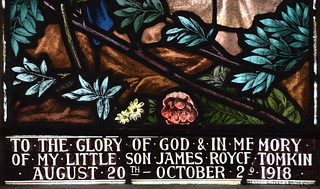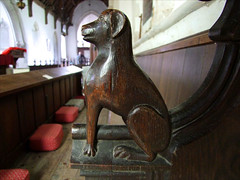| |
|
Two
of the more remote churches in Suffolk are
actually less than a mile apart, just to the east
of Stowlangtoft. One serves the parish of
Langham, and the other is this one, St Michael at
Hunston. It hides in a gloomy dip behind a farm,
and the only way to approach it is up a muddy
track between the farm and a field.
The exterior aspect is interesting and not a
little odd. For a start, this is basically a
small Norman church, but it has a massive south
transept. The effect is something like two
separate churches which have got stuck together
at right angles. The lancets and three-leaded
light of the transept window look exciting, but
they are all renewals, from the 19th century
restoration. However, the top of a medieval
priests door in the south chancel wall was also
revealed at some point, and infilled with a
Decorated window.
The overwhelming presence inside the church is of
the Heigham family, who lived for generations at
Hunston Hall. At their most imposing, they are
here in the persons of Captain George Thomas
Heigham of the Royal Irish Dragoon Guards and his
son Major George Henry John Heigham of the Royal
Welsh Fusiliers. Their Coade stone memorial,
surmounted by sabres and regimental badges, notes
that Heigham fils was killed at Lucknow,
during the attempt by the British to impose
authoritarian rule in the years immediately
following the Indian Mutiny, and is buried in the
graveyard there. His father went to a gentler
sleep at Sproughton on the outskirts of Ipswich.
Most of the Heighams cluster up in the sanctuary,
and here also is some of the excellent early 20th
century glass in the church, all by Heaton,
Butler & Bayne. Most memorable is the Blessed
Virgin and Child which was installed to the
Glory of God and in memory of my little son James
Royce Tomkin August 20th - October 2nd 1918.
Beside it is their very good war memorial window
depicting the angel of Victory, and captioned To
the Glory of God and in Memory of the Hunston Men
who fell in the War 1914-18 from the Heigham
Family, a pleasing example of what was once
a typical rural patronage.   
 
There
are plenty of medieval survivals, a couple of
them rather unusual. The oldest is the head of a
Saxon cross, found in the graveyard, and one of
only about half a dozen in East Anglia. The most
spectacular is the large, flat image niche in the
transept with its extraordinary floriated border.
If you look closely, the petals and leaves are
not identical, but each is slightly different.
Not far off is a most unusual corner piscina, set
into the corner as if in reverse of the usual
form. The font is also 13th Century, and there is
no reason to think it did not come from this
church originally. It is a plain drum, the
simplicity of which suits this quiet place, and
it has been reset on a Victorian colonnade. The
bench ends are clearly from the same group as at
nearby Tostock, and may even be from that church
originally.
  
What
appears to be a battered stone memorial on the
south side of the nave is actually a charity
board. It seems to have been reset in a window
splay. There is a charmingly rendered
transcription of it on a board opposite, and it
remembers the will of Mrs Mary Page, who died in
1731. Her passion was education, and she left
money to provide for a Mistress to teach
three poor girls to read, knit, spin and sew and
also for proper books to be purchased for the
children not only whilst in school but chiefly to
be given them when at the end of 3 years they
shall leave the school.
I was delighted to discover that, as the gift was
in the form of land, it has kept pace with
inflation, and the terms of this noble bequest
are still adhered to, albeit in a slightly
different form. The Mary Page Charity still
provides funds for school books and uniforms for
the children of the Parish. No doubt successive
PCCs have taken note of Mrs Page's final
injunction: As ye Parishioners of Hunston
hope for the Blessing of Almighty God to attend
them and their succeeding generations, let them
not dare to pervert ye Revenues of Lands thus
bequeathed to any other purposes whatsoever.
|
|
|

